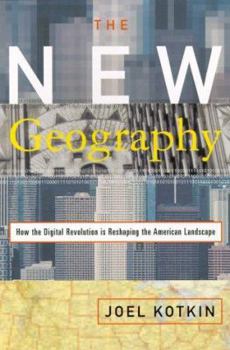The New Geography: How the Digital Revolution Is Reshaping the American Landscape
Select Format
Select Condition 
Book Overview
One of the nation's great forecasters of business and public policy trends takes a candid look at the digital revolution and discusses how it will effect the way we live, work, and play. Reprint.... This description may be from another edition of this product.
Format:Hardcover
Language:English
ISBN:0375501991
ISBN13:9780375501999
Release Date:November 2000
Publisher:Random House (NY)
Length:242 Pages
Weight:2.00 lbs.
Dimensions:0.9" x 5.8" x 8.6"
Customer Reviews
4 ratings
20/20 foresight
Published by Thriftbooks.com User , 18 years ago
This book is a better read in 2005 than it was when it came out in 2000 because it's easier to understand the map Kotkin was drawing now that we can see it played out across the country. Creative and artistic people are just now moving into downtown Los Angeles; the traffic in Austin is awful because they didn't plan on the kind of growth they got; Detroit still has not cohesive plan in place for growth. But the book also puts these changes into historical context, so we know that our change isn't the first of its kind and will likely not be the last.
Could sprawl be dying?
Published by Thriftbooks.com User , 20 years ago
A thoughtful analysis of technology's impact on society with some ideas that are worth acting upon.While the premise of this book is not new, Kotkin's thoughtful analysis of how technology has and is changing our geography puts this book securely in the "must read" category. Kotkin's premise is that technology is changing America's landscape as much or more than did the Industrial Revolution. While, in some respects, technology has de-personalized our society (and there are many tangible examples; the malling and sprawling of America with "category killer" retail and soulless master planned communities), it has also emerged as a great unifier causing people to seek more connection, not less. Moreover, technology has enabled more choices, particularly on where one chooses to live and work. Consequently, the notion of "place" is more important than in the past and consumers of place are more demanding and sophisticated.What all this means is that we are seeing a very positive evolution back to "Renaissance" type cites (populated by artisans, small business and niche players enabled with technology) where place and commerce are wed. Conversely, we are also experiencing the segregation of the "haves" of technology and subsequent wealth from the "have-nots". Further segregation, Kotkin argues, will erode the very positives that are emerging.Kotkin takes pains to organize his argument and does so by citing both historical markers (i.e.-Fall of Rome, the Dark Ages and The Enlightenment/Renaissance) with geographical categories that describe our emerging urban landscape (ie-Valhallas, Nerdistans, Urban Cores and Midopolis).My one complaint is that Kotkin didn't give enough airtime to the issues around how the segregation of the classes will potentially erode the more positive impacts of technology. This subject emerges only toward the end of the book with poignant comparisons to the Fall of Rome. While some of the rosy "Internet Era" optimism (copyright 2000) is evident here, the gist of the message remains completely valid. This is an excellent book. This "New Geography" is worth thinking about and acting upon. Kotkin's last two lines are illustrative; "As people and advanced industries hunt the globe for locations, they will not necessarily seek out those places that are the biggest, the cheapest, or the most well favored by location. Instead they will seek out a new kind of geography, one that appeals to their sense of values and their hearts, and it is there that the successful communities of the digital age will be found." Do you live in one of these communities or not? Bravo!
Dispatch from Nerdistan
Published by Thriftbooks.com User , 23 years ago
This book is more important then ever as the tech sector emerges from recent turmoil. I found it extremely insightful in describing how where we live and work has become so important after technology rendered us mobile. Truly the guidebook for an economy liberated by the internet from the confines of 'place', but that is now faced with a much greater choice of where to be.
No map needed in The New Geography.
Published by Thriftbooks.com User , 23 years ago
For years we've been hearing about how the Internet would revolutionize the way people live and work. Now Joel Kotkin gives us a book about the Internet's influence on where people live and work. The New Geography highlights what makes some locations more attractive than others in this digital age. Using easy to understand terms, quotes from people in the know, and page after page of demographic data and examples, Kotkin separates the modern and desirable "nerdistans" from the overbuilt and decaying cities that were so often associated with success. Because today's connected workers can live anywhere they want, they will live anywhere they want. If city leaders are serious about attracting new businesses and the affluent citizens those businesses bring, Kotkin's book is a must read. I found it particularly valuable because I am a newly transplanted resident in an up and coming nerdistan. Having recently attended a lecture by Kotkin, I can say I know what he's talking about. Other readers will too. The New Geography is a little scholarly and dry for five stars, but a very informative book indeed.





